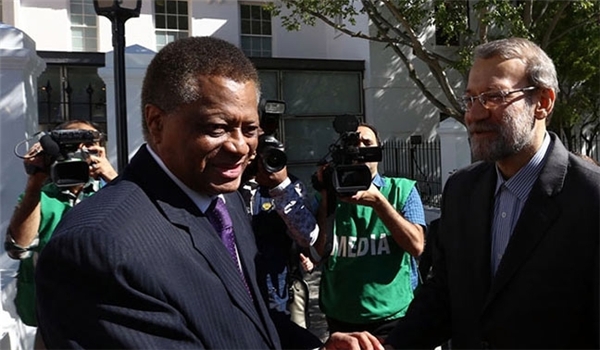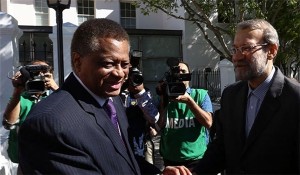Larijani Blasts Genocide of Muslims in Central African Republic

 Iranian Parliament Speaker Ali Larijani strongly condemned the genocide of the Muslim population in the Central African Republic, and asked the international bodies to take immediate action to prevent the ongoing bloodshed in the African country.
Iranian Parliament Speaker Ali Larijani strongly condemned the genocide of the Muslim population in the Central African Republic, and asked the international bodies to take immediate action to prevent the ongoing bloodshed in the African country.
Speaking in a meeting with South African Parliament Speaker Siasi Sulu in Pretoria on Wednesday, Larijani blasted the violent behavior shown towards Muslims in the Central African Republic, and described it as “a kind of genocide”.
The Iranian parliament speaker called for collective efforts by African states and international bodies to help end violence in the Central African Country.
Meantime, Larijani pointed to the Syrian crisis, and said, “The Syrian crisis has no military solution and presence of foreign fighters and professional terrorists have complicated the situation in Syria.”
The Iranian parliament speaker also referred to the status quo in Tehran-Pretoria relations, and said, “We want expansion of ties between Iran and South Africa in all areas, specially in petrochemical industry, oil and mining.”
Larijani welcomed the presence of South African investors in Iran, and said, “Iran and South Africa enjoy vast potentials for bolstering economic ties.”
The South Africa parliament speaker, for his part, welcomed expansion of relations between the two countries, and said, “South Africa and Iran share common views towards various international issues including, Palestine.”
He noted that Pretoria is willing to use Tehran’s experiences in all fields, and said, “We support Iran’s access and use of the nuclear program for peaceful purposes.”
Last month, Iranian Deputy Foreign Minister for Arab and African Affairs Hossein Amir Abdollahian called on people from all walks of life in the Central African Republic, regardless of their religion and ethnic group, to be watchful of the divisive plots hatched by the enemies to wreak havoc on the country.
“The killing of innocent Muslims of Central Africa is the result of fueling the religious fanatic views among the people who have lived peacefully along each other for decades,” Amir Abdollahian said.
He noted that incidents in Central Africa are in line with the Islamophobia scenario, and said, “Christian extremism in the Central Africa is in continuation of the ominous phenomena of extremism among Muslims.”
The Iranian official stressed that the Islamic Republic of Iran condemns both Christian extremism and Islamic extremism in Central Africa.
“The current situation in Central Africa has paved the grounds for ethnic cleansing in the Southern Africa, we should make collective efforts to prevent repetition of homicide of Rwanda,” Amir Abdollahian said.
He said supports UN resolutions and Liberville agreement, and announced that helps will be sent for the Muslim refugees of Central Africa.
The Toronto Star reported last Monday that Christian militiamen killed at least 70 people in the remote Southwest of Central African Republic, at one point ordering a group of Muslims to lie on the ground and shooting them one by one.
The militiamen, known as the anti-Balaka, slaughtered the Muslims in the village of Guen earlier this month, said Rev. Rigobert Dolongo, a Catholic priest who helped bury the bodies. At least 27 people were killed on the first day of the attack, while 43 others were slain on the second day, he said.







